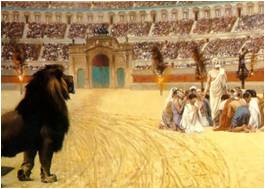 First and Second Peter are grouped in what are called the General Epistles, written to the Church at large. The theme of First Peter is the refining and growth potential in our sufferings, 1Pe 1:3, 1Pe 1:6; 1Pe 2:2. This epistle was written to believers scattered by persecution throughout Asia Minor (1 Pe 1:1). The date was circa 64-65 A.D.—the beginning of Nero’s persecutions. First Peter is the best known and loved of these epistles, called by E.J. Goodspeed, “One of the most moving pieces of persecution literature.” This epistle is written to suffering believers, and is styled by Isaac Walton as, “affectionate, loving, lowly, and humble.” This epistle conveys an intense expectation of the Lord’s return as seen in 1Pe 1:5, 1Pe 1:7, 1Pe 1:13, 1Pe 2:12, 1Pe 4:13, 1Pe 4:17, 1Pe 5:1, 1Pe 5:4.
First and Second Peter are grouped in what are called the General Epistles, written to the Church at large. The theme of First Peter is the refining and growth potential in our sufferings, 1Pe 1:3, 1Pe 1:6; 1Pe 2:2. This epistle was written to believers scattered by persecution throughout Asia Minor (1 Pe 1:1). The date was circa 64-65 A.D.—the beginning of Nero’s persecutions. First Peter is the best known and loved of these epistles, called by E.J. Goodspeed, “One of the most moving pieces of persecution literature.” This epistle is written to suffering believers, and is styled by Isaac Walton as, “affectionate, loving, lowly, and humble.” This epistle conveys an intense expectation of the Lord’s return as seen in 1Pe 1:5, 1Pe 1:7, 1Pe 1:13, 1Pe 2:12, 1Pe 4:13, 1Pe 4:17, 1Pe 5:1, 1Pe 5:4.
Gene Cunningham - September 15, 2003
Daniel #6

Scripture References: John 7:17, Daniel 4:19-27, Romans 10:18, Romans 5:8, Daniel 4:10-18, Jeremiah 29:13, Daniel 4:4-18, Romans 1:18-30, Romans 2:11, Ezekiel 28:3, Romans 1:17, Daniel 4:1-3, Isaiah 40:17-21, Matthew 21:44, Ezekiel 14:20, Romans 10:17, Luke 21:24, Acts 17:1-34, Daniel 2:35, Ezekiel 14:14, Romans 1:20-22, Romans 1:17-21, Daniel 4:34-37, Daniel 9:27, John 2:2, Acts 17:27, Daniel 4:28-33, Daniel 4:9, Hebrews 13:8
From Series: "Daniel"
No summary for this series yet.

